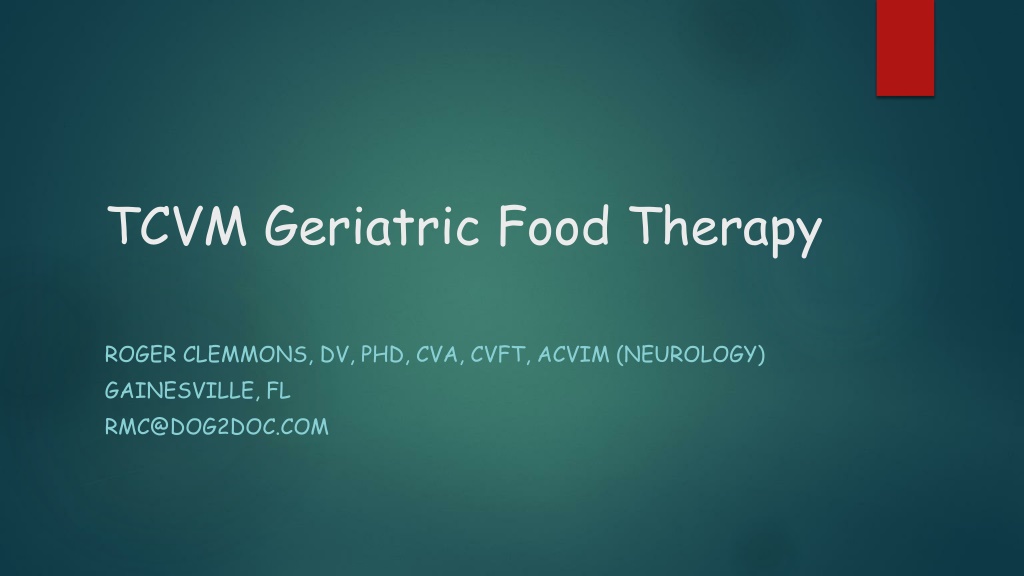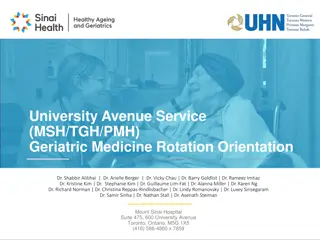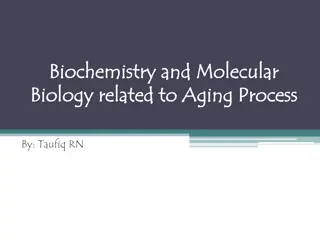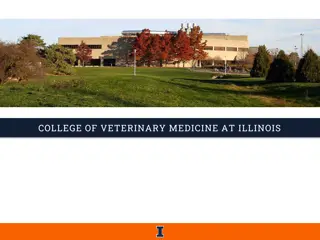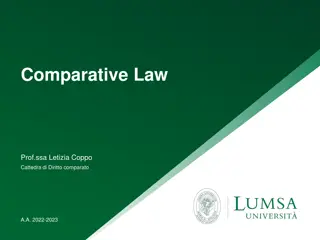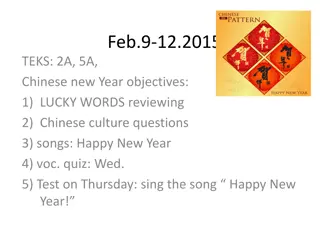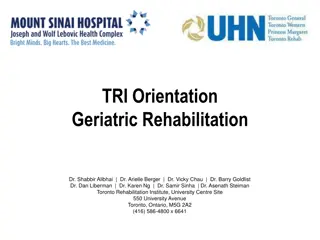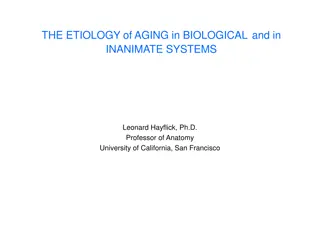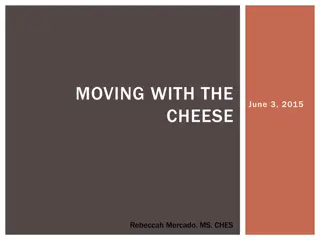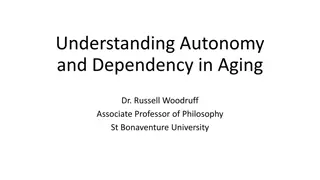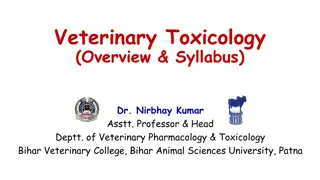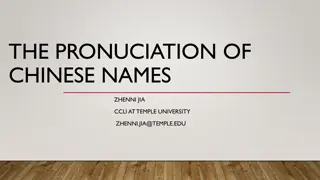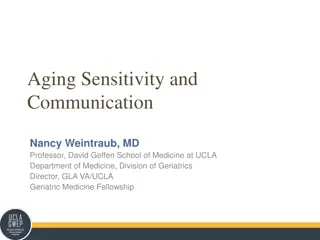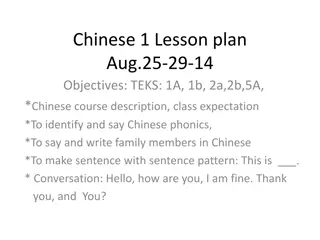Understanding Aging and Geriatric Medicine in Traditional Chinese Veterinary Medicine
As animals age, their organ functions decline according to Traditional Chinese Veterinary Medicine principles. The liver, heart, spleen, lung, and kidney are affected at different stages, leading to various health issues such as weakness, cognition decline, and incontinence. Recognizing signs of aging and implementing TCVM geriatric food therapy can help support and improve the overall well-being of senior pets.
Download Presentation

Please find below an Image/Link to download the presentation.
The content on the website is provided AS IS for your information and personal use only. It may not be sold, licensed, or shared on other websites without obtaining consent from the author. Download presentation by click this link. If you encounter any issues during the download, it is possible that the publisher has removed the file from their server.
E N D
Presentation Transcript
TCVM Geriatric Food Therapy ROGER CLEMMONS, DV, PHD, CVA, CVFT, ACVIM (NEUROLOGY) GAINESVILLE, FL RMC@DOG2DOC.COM
What is aging? At age 50 years old, the liver starts to decline, the lobe of the liver starts to become thinning and eyes start unclearness. At age 60 years old, the heart Qi starts to decline causing worry and sadness, Qi and blood is sluggish and weakness causing favor in lying down. At age 70 years old, the spleen Qi is deficient and the skin desiccates and withers. At age 80 years old, the lung Qi debilitates, the corporeal soul (po) is gone causing error during talk. At age 90 years old, the kidney Qi parches, all other four zang organs and channels are exhausted Huang Di Nei Jing The Yellow Emperor s Classic of Internal Medicine
TCVM Geriatric Medicine & Aging Jing Deficiency Zang fu organ function declines with age Kidney is ruler of prenatal essence SP/ST is the origin of post heaven Qi Generalized Qi Deficiency Blood Qi stagnation/stasis
TCVM Geriatric Medicine & Aging Combination of excess and deficiency Deficiency: mostly Qi deficiency, then Yin Yang Excess: mostly stagnation and phlegm Zang Fu Qi activities Heart: ability to circulate blood Lung: respiratory actions to inhale/exhale Kidney: ability to pull air down from lung, reproductive ability, bone growth and metabolism control of sphincters (urinary/fecal) Yang ability to warm the body as it declines (late stage)
What age is considered old? Small/Medium breeds: dogs 7 10 years and older Large to Giant Breeds: 5 7 years and older Cats:7 10 years and older Chronic illness or Jing deficiency can make animals age before their time Signs of illness or disease may be subtle or just energetic disharmony prior to clinical symptoms Multiple disharmonies or imbalances can occur at the same time
TCVM Geriatric Medicine & Aging Qi Deficiency: LU, HT, SP, Kid General weakness Exercise intolerance Decreased appetite, anorexia Muscle atrophy Loose stool or too frequent defecation/ urination Urinary or fecal incontinence Dyspnea Tongue: pale, wet, thick Pulse: weak, thin
TCVM Geriatric Medicine & Aging Yin Deficiency: LU, HT, LIV, KID Panting Cool seeking Thirsty Dry signs: eyes, mouth, skin, fur, nails Small/ fine flake dander Mental anguish (Heart Yin) Leads to Yang deficiency when fluid is consumed Tongue: red, may have coating Pulse: thin, wiry, or choppy
TCVM Geriatric Medicine & Aging Yang Deficiency: Generalized Warm seeking Cold back Lethargy Food stagnation/ stasis Edema Tongue: pale, wet Pulses: deep, weak (R<L)
TCVM Geriatric Medicine & Aging Stagnation Sleep more, less active Difficulty getting up, painful Anxious, confused, unaware Vomiting or constipation Tongue: dark, purple Pulse: fast, wiry
TCVM Geriatric Medicine & Aging Blood Deficiency: SP, LIV, Kid Chronic stagnation, Qi deficiency, Yin deficiency Dull, dry fur coat with thick flake dander Pale and dry pads and nails Anxiety, depression, insomnia, poor memory Muscle tremors Tongue: pale, dry, thin Pulse: deep, weak (L<R), choppy
TCVM Geriatric Medicine & Aging Phlegm Substantial Secondary excess pathogen in the lungs Mass, growth, nodules Non substantial Physical lymphadenopathy, arthritis, joint deformity In Channels numbness, tingling, dysfunction In Heart anxiety, depression, crazy in the mind mansion In GB/ KID stones (Kidney, Bladder) Tongue: thick, greasy, white coating (thin or thick) Pulse: slippery
TCVM Geriatric Medicine & Aging Vital birth energy and fluid are used up Lowered metabolic rate Less activity Less energy requirement (up to 20%) Increased stagnation in joints Intestinal transit time decreased Difficult to extract the same nutrients or energetics from food Weak digestion, may not be able to handle whole grains Lowered excretion of nutrients Decreased organ reserves Decreased body mass Decreased ability to regulate blood sugar Takes longer for postprandial glucose to be metabolized Receptor abnormality decreases insulin response Decreased ability to metabolize carbohydrates
Geriatric Food Requirements Higher Protein Compensates loss of lean body mass Decrease protein turnover rates Decreased Fat Helps maintain body weight Enhanced Antioxidants Supports declining immune systems Omega-3-Fatty Acids Helps with joint and kidney function
Goals of Treatment Increase the QUALITY OF LIFE Slow Disease Onset or Progression Warm the middle burner Nourish Kidney Essence Prevent too much Qi or Blood consumption Help the body breakdown, digest, assimilate, disperse and use as many vital nutrients as possible For the Mind, Body and Soul
Goals of Treatment Feed moderate amounts of food, often Nutrient extraction Glucose assimilation Prevent Stomach Qi stagnation Feed easily digestible food Well cooked middle Jiao cannot heat Food preparation finely chopped Sprouts of grains, grasses, legumes and seeds Soups, stews, congee Digestive enzymes & probiotics Feed nutrient rich foods Organic greater nutrient composition Non processed foods Feed warming foods Energetics Temperature
Goals of Treatment Avoid pro inflammatory foods Nightshades: bell pepper, eggplant, white potato Goiterogentc: cruciferous raw: broccoli, kale, cabbage, turnip, radish, horseradish, rutabaga, canned food Feed anti inflammatory foods/supplements Alternate lower meat diet lower PG Lower saturated fats lower PG Increase omega 3 FA lower PG/leukotrienes Cold water fish, mackerel, trout, salmon, tuna Increase Vitamin C Also generates collagen Cantaloupe, strawberries, peppers, cranberry Supplements to help alleviate arthritis pain MSM, SAM e, alfalfa, dandelion, turmeric, white willow bark
Goals of Treatment Treat imbalance or disharmonies as early as possible Older animals take longer to heal or recover Use to 2/3 dose of herbs for longer time (maybe for life) Avoid very strong herbs or use them for short periods of time Too bitter: Coptis (Huang Lian) Too cold: Gypsum (Shi Gao) Bitter cold herbs cause Yang Qi damage Too hot: Aconite (Fu Zi) Too pungent: Ephedra (Ma Huang) Hot pungent herbs consume Yin Select Tonic herbs or mild regulating herbs Tonic: Codonoposis (Dang Shen), Angelica (Dang Gui) Movers & shakers of Qi: Citrus (Chen Pi) Moving Blood to resolve stagnation: Ligusticum (Chuan Xiong) Transform phlegm: Fritillaria (Chuan Bei Mu) Don t forget about tui na, acupressure, acupuncture and daily EXERCISE!!!!!
Qi Tonics Energetics: Neutral to warm Meat: beef, chicken, duck, goose, lamb, quail, eggs, catfish, carp, eel, herring, trout Grain/Legumes: brown rice, coix, glutinous rice (caution with digestion), millet, lentils, soy bean, string bean Vegetables/Fruit: peas, potato, sweet potato, yam, shiitake, cherry, date, lychee, fig Nuts: chestnut, coconut, peanut, walnut Other: molasses
Qi/Yang Tonics Energetics: warming or hot Meat/oil: chicken, liver (esp. chicken, lamb), kidney (esp. lamb), mutton, venison, beef, shrimp, catfish, anchovy, trout, olive oil Grains/Legumes: oats, white rice, corn, quinoa, broad bean Vegetables/Fruit: carrot, squash, winter squash, pumpkin, ginger, garlic, pepper, apricot, citrus, peach, plum Nuts: walnut Other: brown sugar, rice vinegar, cinnamon, cloves Avoid: cold food cereal grasses (wheat grass, barley grass), seaweed
Blood/Qi/Yin Tonics Neutral foods: Meat: pork, eggs, goose, duck, catfish, salmon, sardine, tripe, quail Grains/Legumes: corn, sweet rice, soy bean, string bean Vegetables/Fruit: yam, sweet potato, white potato, grapes Other: green tea
Blood Tonics Energetics: Tonify SP to help digestion and absorption of nutrients to make more blood Digestive enzymes, probiotics Chicken, duck, goat, rabbit, carp, eel, aduki, rice, winter squash, carrot, turnip black bean, peas, sweet potato, nutmeg Tonify KID Blood/ Jing Dark foods with salty flavor (not too much)
Blood Tonics Generalized Meat/ Dairy: beef, bone marrow, liver, duck, goat, goose, salmon, sardine, eggs, milk (goat/ sheep) Grain/Legume: amaranth, barley, coix, rice, wheat germ/ grass, aduki bean, black bean, soybean, tempeh Vegetables/ Fruit: reishi, shiitake, alfalfa sprout, artichoke, spinach, sweet potato, chard, kale, watercress, apricot, avocado, fig, date Other: sesame/ sunflower seed, parsley, microalgae, bee pollen, miso, molasses
Stagnation Focus: Improve Qi/Blood Flow Meat: chicken, lamb, venison, shrimp, crab Vegetables/Fruits: carrot, radish, watercress, mustard greens, hawthorn berry, citrus inc peel, Other: vinegar, ginger, garlic, turmeric, clove, dill, coriander, chestnut
Phlegm Focus: Strengthen spleen, drain damp, transform phlegm Strengthen Spleen: beef, salmon, tuna, millet, oats, rice, sweet potato, pumpkin, apple, cherry, dates & jujube, winter squash, ginger Drain Damp: barley, rye, mung bean, soy bean, alfalfa, celery, radish, mushroom, lemon, garlic, horseradish, mustard green Transform Phlegm: Clam, oyster, apple, pear, citrus and peel, seaweed, garlic, thyme, pepper, peppermint, almond Avoid: thick, damp, sticky food: dairy, fat, raw, too yin, alcohol
Treatment of CCD Selegiline 0.5-1 mg/kg QD AM FDA approved 69% improved vrs 52% placebo Vitamin E (& other antioxidants) Up to 50 mg/kg Ginko biloba 1-2 mg/kg BID extract Acetylcysteine 5-25 mg/kg BID St John s wort 2-4 mg/kg Westlab Pharmacy 1-800-4WESTLA info@westlabpharmacy.com
